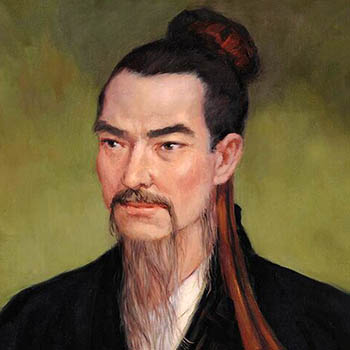
Mò Dí (墨翟), better known as Mòzǐ or “Master Mò,” flourished c. 430 BCE in what is now Tengzhou, Shandong Province, China.1 Likely an artisan by craft, Mò Dí attracted many dedicated followers and founded the philosophical school of Mohism during China’s Warring States Period (475 - 221 BCE).
Like other philosophers of his day, including the better-known Confucius, Mò Dí traveled from state to state to persuade rulers to adopt policies intended to end war, alleviate poverty, install meritocracy, and promote the welfare of all. The Mohists advocated China’s first universalist, impartial ethic, and had a significant influence on the epistemology, language, logic, and political theory of early China. Perhaps of greatest historical significance, they shaped profoundly the philosophical methodology and the ethics of early Confucianism, including that of philosophers Mèngzǐ and Xúnzǐ, whose thought would come to dominate Imperial China during its first two millennia.2
The philosophy of Mò Dí is articulated, developed, and compiled by his followers in an anthology called the Mòzǐ. The Mòzǐ comes to us from a period of extreme violence during which feudal lords fought perpetual wars of aggression for control over the part of the world we now know as China. For the peasant class, life in the Warring States was harsh, characterized by regular military conscription, imprisonment by conquering states, and labor extortion by the nobility to fund palaces, displays of music, state ceremonies, and extravagant burials.3 The Mòzǐ is most centrally a moral and political treatise opposing such violence and exploitation. It vigorously condemns wasteful luxury, elaborate ceremonies and rituals, political incompetence, and all forms of aggressive warfare, advocating the replacement of these harmful practices with those policies which promote the benefit of all.
While the Mòzǐ is most concerned with socio-political reform, it makes numerous advances in theoretical philosophy as well. The Mohists were the first in Ancient China to engage in the kind of rigorous, argumentative philosophy that is characteristic of contemporary philosophers.4 Among the developments of the Mohists was the closest ancient predecessor to utilitarianism. They defend an ethic centered on taking those actions that maximize the benefit of all—where the benefit of all, for the Mohists, is whatever increases political order, material wealth, and population throughout the whole world.
The Mohists are also the first to introduce a sophisticated version of conceptual engineering resembling the work of contemporary feminist philosophers and utilitarian J. J. C. Smart. The Mòzǐ argues that when we draw conceptual distinctions between one thing and another, we should form our distinctions in part on the basis of which distinctions most promote the benefit of all.5 Similarly, they argue that we should reject fatalism—the idea that the future is predestined and there is nothing that human agents can do to change it—on account of its deteriorative effects on human motivation.6
How to Cite This Page
Want to learn more about utilitarianism?
Representative works of Mò Dí
- Mòzǐ (c. 3rd Century BCE)
Resources on Mò Dí’s Life and Work
- Fraser, C. (2015). Mohism. The Stanford Encyclopedia of Philosophy. Zalta, E. N. (ed.).
- Fraser, C. (2016). The Philosophy of the Mòzǐ: The First Consequentialists. New York: Columbia University Press.
- Loy, H. C. Mozi. The Internet Encyclopedia of Philosophy.
Prominent Mò Dí Quotes
- “Universal love is really the way of the sage-kings. It is what gives peace to the rulers and sustenance to the people.”7
- “The benevolent person planning on behalf of the world is like this… If the world is poor, he undertakes to enrich it; if the people are few, he undertakes to increase their number; if the multitude is in disorder, he undertakes to put them in order. When he is in these situations, there are indeed cases when his strength is insufficient, his resources exhausted, or his knowledge lacking, and then he gives up. In no case would he dare spare any effort, conceal any scheme, or withhold any benefit without pursuing them on behalf of the world.”8
- “The task of the benevolent is surely to diligently seek to promote the benefit of the world and eliminate harm to the world and to take this as a model throughout the world. Does it benefit people? Then do it. Does it not benefit people? Then stop.”9
- “Thus the various lords not caring about each other, they inevitably go to war; heads of clans not caring about each other, they inevitably subvert each other; people not caring about each other, they inevitably injure each other; rulers and subjects not caring about each other, they are not generous and loyal; fathers and sons not caring about each other, they are not paternally kind and filially devoted; elder and younger brothers not caring about each other, they are not peaceful and harmonious. The people of the world all not caring about each other, the strong inevitably oppress the weak, the wealthy inevitably humiliate the poor, the noble are inevitably contemptuous of the lowly, and the cunning inevitably deceive the ignorant.”10
Written by Tyler John.









Fraser, C. (2016). The Philosophy of the Mòzǐ: The First Consequentialists. New York: Columbia University Press, 6-8. ↩︎
Graham, A. C. (1976). Later Mohist Logic, Ethics and Science. Hong Kong: Chinese University Press, 64-65 & 79. ↩︎
Fraser, C. (2016), 1-7; Lewis, M. E. (1999). “Warring States: Political History” in The Cambridge History of Ancient China, ed. Michael Loewe and Edward L. Shaughnessy, 587-650 (Cambridge: Cambridge University Press). ↩︎
Fraser, C. (2015). Mohism. The Stanford Encyclopedia of Philosophy. Zalta, E. N. (ed.). ↩︎
Fraser, C. (2016), 53-57. ↩︎
Mòzǐ 35-37. ↩︎
Mòzǐ 4: 12, W. P. Mei transl. ↩︎
Mòzǐ 25: 1, C. Fraser transl. ↩︎
Mòzǐ 32: 1, C. Fraser transl. ↩︎
Mòzǐ 15: 1b, C. Fraser transl. ↩︎


